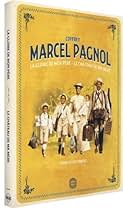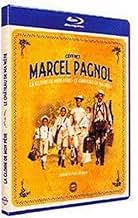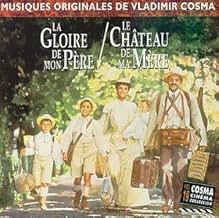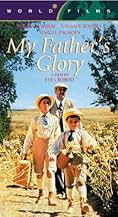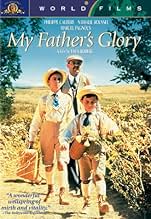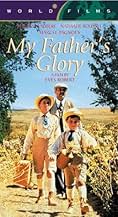IMDb रेटिंग
7.6/10
7.4 हज़ार
आपकी रेटिंग
उन्नीसवीं शताब्दी के अंत में, छोटा मार्सेल प्रोवेंस ग्रामीण इलाकों में अपने माता-पिता के साथ रहता है।उन्नीसवीं शताब्दी के अंत में, छोटा मार्सेल प्रोवेंस ग्रामीण इलाकों में अपने माता-पिता के साथ रहता है।उन्नीसवीं शताब्दी के अंत में, छोटा मार्सेल प्रोवेंस ग्रामीण इलाकों में अपने माता-पिता के साथ रहता है।
- पुरस्कार
- 2 जीत और कुल 5 नामांकन
फ़ीचर्ड समीक्षाएं
This is a movie for those who enjoy magic and nostalgia while floating away in childhood memories. It is the calm and enchanting story of the adventures of Marcel Pagnol. Julien Ciamaca does an outstanding job, he is handsome, naive and buoyant. The landscape and the narrative style make this movie, at least in my eyes, a real masterpiece. The entire story is full of nostalgia and deals with Marcel's very own perception of life. His friendship with Lili is honestly depicted and wonderfully staged. The boys do a great job, indeed. It is a tale that takes you back to contemporary France and revives the summer in the Provence region, a summer full of innocent joy and adventures. Inspiring and well-acted, the setting is beautiful and the music just perfect. All characters are well cast.
This beautiful, charming work (and its companion MY MOTHER'S CASTLE) is lifted from the memoirs of filmmaker/screenwriter Marcel Pagnol.
It is a loving, romanticized recreation of Pagnol's childhood trips to the south of France.
Director Yves Robert ices every scene with sweet affection and a seemingly effortless attention to detail.
There are so many moving, heart-tugging scenes.
Describing them all would spoil the confection.
I'll mention one. Young Marcel accompanies his father, Joseph, a school teacher, to school one day. Not believing that Marcel can read already, Joseph writes a simple declaration of his love for Marcel on the blackboard. Marcel then surprises his father by reading out loud what his father wrote. It is such a touching, affecting scene.
MY FATHER'S GLORY is bursting to the seams with such magic.
Vladimir Cosma's score perfectly captures the period and tone of Pagnol's memories.
Simply exquisite.
It is a loving, romanticized recreation of Pagnol's childhood trips to the south of France.
Director Yves Robert ices every scene with sweet affection and a seemingly effortless attention to detail.
There are so many moving, heart-tugging scenes.
Describing them all would spoil the confection.
I'll mention one. Young Marcel accompanies his father, Joseph, a school teacher, to school one day. Not believing that Marcel can read already, Joseph writes a simple declaration of his love for Marcel on the blackboard. Marcel then surprises his father by reading out loud what his father wrote. It is such a touching, affecting scene.
MY FATHER'S GLORY is bursting to the seams with such magic.
Vladimir Cosma's score perfectly captures the period and tone of Pagnol's memories.
Simply exquisite.
This is one film I would recommend to everybody. I remember when I saw that film in the theatre in france in 1990, I fell in love with it,the acting is great ,the locations are beautiful,the story is very touching,this film is a winner for sure.I probably saw this film in is follow up a thousand time and after each viewing it's just getting better. I would also say that the music of Vladimir Costa is fantastique it fits the scenery like a pair of gloves. The best french film ever in my opinion.
This, like "Jean de Florette" and "Manon Of The Spring" is the first of two French films that go together. The second part of this story is the film, "My Mother's Castle." See them both, but if you can only see one, my recommendation is "My Mother's Castle."
As in many French films, this offers very little action and not much that is noteworthy but is filled with interesting characters and excellent storytelling. The French still offer that great storytelling, something that has slowly faded among filmmakers in other countries.
This story is based on the memoirs of Marcel Pagnol, a very Liberal educator and atheist. His views are probably the main reason critics all loved this movie. They could identify.
Despite the father's shortcomings, there is a nice appeal here as all the characters are interesting to varying degrees. I love the way they all express themselves, certainly different than we do here in North America. As with most of these French stories, there is very little profanity, too.
As in many French films, this offers very little action and not much that is noteworthy but is filled with interesting characters and excellent storytelling. The French still offer that great storytelling, something that has slowly faded among filmmakers in other countries.
This story is based on the memoirs of Marcel Pagnol, a very Liberal educator and atheist. His views are probably the main reason critics all loved this movie. They could identify.
Despite the father's shortcomings, there is a nice appeal here as all the characters are interesting to varying degrees. I love the way they all express themselves, certainly different than we do here in North America. As with most of these French stories, there is very little profanity, too.
Marcel Pagnol always wanted to adapt for the screen his childhood memories that he related in 4 novels. Unfortunately, he died without he made his plan. So, it was one of his friends, Yves Robert who undertook to make the coveted movie and the result turns out to be very convincing. Yves Robert's movie restitutes perfectly the atmosphere of Pagnol's book and he made a tender, hearty movie, lulled by Vladimir Cosma's nonchalant music where the shiny sun and sky of Provence reply to the wild beauty of the hills. These hills will make the little Marcel's enchantment. Thanks to a fluid making, Robert films the happiness and the naïvety of childhood with a certain impishness. Besides, Robert always enjoyed filming childhood like Truffaut and we particularly rediscover the quoted impishness in one of his movies: "la guerre des boutons". Robert introduces us the Pagnol's family and shows liking towards his characters. More than Marcel's character, these are his feelings towards his family which Robert tries to define, especially the pride towards his lucid and ambitious father (excellent Philippe Caubère) after his hunting achievement. Moreover, he loves tenderly his mother but tends to despise his uncle. He blames him for being a liar and a conceited person. At the end, a limpid movie that remembers with nostalgia of a past era. Pagnol would certainly have appreciated the result. If the movie introduces a bitter end, it depicts the last picture as something symbolic: " the glory of Marcel's father".
क्या आपको पता है
- ट्रिविया'La Gloire de mon père', published in France in 1957, is the first volume of four autobiographical novels by Marcel Pagnol. The second volume, 'Le château de ma mere', was published in 1958. In the novels, Marcel's meeting Lili takes place in volume two, as does Marcel's decision to stay at Provence as a hermit. The two novels were translated into English and published by Doubleday (in the U.S) as a single book in 1960 under the title 'The Days Were Too Short', This translation was reprinted by North Point Press as a single book titled 'My Father's Glory / and / My Mother's Castle' in 1986.
- गूफ़On the family's holiday, each time that it is raining the sky is bright and without a cloud (except the scene with the storm).
- भाव
Augustine: You need your gun to go shopping?
Joseph Pagnol: You never know.
टॉप पसंद
रेटिंग देने के लिए साइन-इन करें और वैयक्तिकृत सुझावों के लिए वॉचलिस्ट करें
- How long is My Father's Glory?Alexa द्वारा संचालित
विवरण
- रिलीज़ की तारीख़
- कंट्री ऑफ़ ओरिजिन
- भाषाएं
- इस रूप में भी जाना जाता है
- My Father's Glory
- फ़िल्माने की जगहें
- Signes, Var, फ़्रांस(bird hunting party)
- उत्पादन कंपनियां
- IMDbPro पर और कंपनी क्रेडिट देखें
बॉक्स ऑफ़िस
- US और कनाडा में सकल
- $17,30,856
- दुनिया भर में सकल
- $17,30,856
- चलने की अवधि
- 1 घं 45 मि(105 min)
- रंग
- पक्ष अनुपात
- 1.85 : 1
इस पेज में योगदान दें
किसी बदलाव का सुझाव दें या अनुपलब्ध कॉन्टेंट जोड़ें

![Bande-annonce [OV] देखें](https://m.media-amazon.com/images/M/MV5BNjNlYzQ0NGQtODdlNS00YzRmLTlhYzQtZDdiOTNiZDZlYWYzXkEyXkFqcGdeQXRyYW5zY29kZS13b3JrZmxvdw@@._V1_QL75_UX500_CR0)

